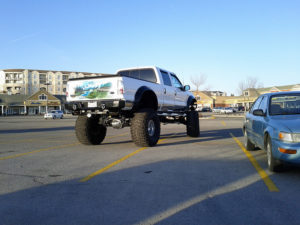What kind of hitch do you need to tow a pop up camper?
Question: What kind of hitch do I need to tow my pop up camper?
I don’t have a trailer hitch yet, so I’m going to have to have one installed. What kind of hitch do I need in order to safely tow a pop up camper?
Answer:
If your vehicle doesn’t already have a trailer hitch, then there are a few factors that you’ll need to consider before you decide what type to have installed. First off, there are two “types” of trailer hitches commonly used in North America: receivers and fixed hitches. Receiver tow hitches basically consist of a square tube that’s mounted to the frame of your vehicle, and you slide in a ball mount of your choice, and fixed hitches either have a fixed ball or allow you to bolt different balls in place.
More important than the type of trailer hitch is the class. In North America, there are four primary hitch classes, which are defined in SAE J684. Each class has a maximum amount of weight that it can tow in addition to a maximum tongue weight–which is the downward pressure that a towed load exerts on the hitch.
Hitch Classes and Capacities
| Class | Tongue/Hitch Weight | Maximum Towing Weight |
|---|---|---|
| Class I | 100 - 200 lbs. | 1,000 - 2,000 lbs. |
| Class II | 250 - 350 lbs. | 2,500 - 3,500 lbs. |
| Class III | 350 - 500 lbs. | 3,500 - 5,000 lbs. |
| Class IV | >500 lbs. | 7,500 - 10,000 lbs. |
See more about: towing with a class I hitch
Pop Up Camper Weights and Hitches
In order to determine what hitch class you need, it’s important to look at two figures: the “dry” or “shipping” weight of your pop up camper and the GVRW. The dry weight is how much the camper weighed when you got it from the factory, assuming that no additional accessories were installed at the dealership. This is the lightest that the camper is probably ever going to weigh, and your hitch (and vehicle) will be able to handle that just to get the camper home.
The term “gross vehicle weight rating” (GVWR) refers to the maximum amount of weight that a vehicle can successfully carry, and the figure also includes the weight of the vehicle itself. That means you can subtract your pop up camper’s “dry” weight from the GVWR to find out how much gear, supplies, and water you can safely load in it. It also means that the GVWR is an easy number to look at to find out what hitch class you need. If your trailer weighs in at under 2,000 lbs., then you’ll probably be fine with a class I hitch. However, it never hurts to go bigger than you need. If nothing else, having a slightly bigger hitch will give you the option of upgrading in the future.
The Importance of Tongue Weight
The “tongue weight” of a hitch is simply the amount of downward force that it can safely take from a trailer. Since all trailers (pop up and otherwise) are designed to tilt forward when not hooked up to a tow vehicle, every trailer exerts some amount of downward force on the hitch it’s hooked up to. Most trailer manufacturers refer to this as “hitch weight” so that’s the number you’ll be looking for.
It’s important to note that the hitch weight and GVWR of a pop up camper don’t directly correlate with one another. Depending on how the weight of a pop up camper is distributed in relationship to its axle, one trailer might have a lower hitch weight than a different trailer that is physically heavier. If you check out our rundown on lightweight pop up campers, you’ll see a specific example of this near the end of the post.
Overloading a Towing Vehicle
While it’s vital to have the right class hitch to tow any given trailer, it’s equally important to never overload the towing vehicle. That’s a somewhat more complicated subject, because you have to take a number of factors into consideration, like the engine, transmission, suspension, and other systems. Some vehicles require an external transmission cooler or other aftermarket add-ons in order to maximize their towing capacity, and you may need to use a load leveling hitch to tow an especially large pop up camper.

